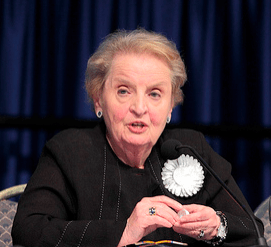Of all the “First Women To. . .” Madeleine Albright is number one on my list of women I would like to interview and, if I could invite some “First Women To. . .” to join me for dinner, she would receive the first invitation.
Madeleine Albright (born Marie Jana Korbelová) knew war and the effects of political activism intimately from an early age. Madeleine (a name she later received at French boarding school in Switzerland) was in London during the blitz, after her family fled Czechoslovakia to escape the Nazis in the era of Adolf Hitler. After the war her family returned to Prague and Belgrade but once again had to flee, this time from the Communists. Her father received political asylum in the United States, obtained a professorship at the University of Denver, and later mentored Condoleeza Rice.
Madeleine Albright’s own mentor was Zbigniew Brzezinski at Columbia. Like many women of her era she stayed home to raise her children but she continued her education, rising at 4:30 a.m. to study. Not surprisingly her interests and scholarship were in Eastern European topics and she became an expert.
Madeleine Albright was serving as chief legislative assistant for Senator Edmund Muskie when Brzezinski became National Security Advisor for the Carter administration and invited Albright to join him. When Carter left the White House she obtained a position at the Woodrow Wilson International Center for Scholars at the Smithsonian Institution and joined the academic staff at Georgetown University. She was a foreign policy advisor to members of the Democratic party, including Vice-Presidential candidate Geraldine Ferraro and Presidential candidate Michael Dukakis.
When President Bill Clinton became President, she managed the transition of the National Security Council for him. He appointed her as U.S. Ambassador to the United Nations and later nominated her as Secretary of State. In an action that hardly seems possible today, the Senate voted 99 to 0 to approve Albright.
Albright’s credits are extensive and her involvement in foreign affairs has not diminished. She has also received many honors, including the Presidential Medal of Freedom.
LEARN MORE:
To find out how Saddam Hussein started Madeleine Albright’s famous pin collection, see: http://www.ted.com/talks/madeleine_albright_on_being_a_woman_and_a_diplomat.html
Michael Dobbs’ Books on Madeleine Albright: Madeleine Albright: Against All Odds; Madeleine Albright: A Twentieth-Century Odyssey
Two of Madeleine Albright’s Many Books: Madam Secretary: A Memoir;Read My Pins: Stories from a Diplomat’s Jewel Box
QUESTION OF THE WEEK:
If you could interview one of the “First Women To. . .,” who would you choose? Which First Woman To. . .would you like to have as a dinner companion?


Nice concept. Good luck with this project.
What a great idea. Learned more about Albright. Interesting life she led, so imbedded in the political upheavals of her time.